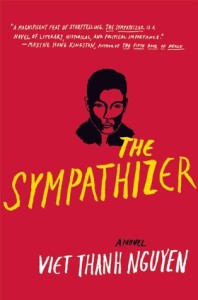This 2015 debut novel finally gives us the Vietnamese war and its aftermath, not from an American perspective but from a Vietnamese point of view. The narrator is half-French and half-Vietnamese, rejected by both cultures, but told by his mother that he will do something extraordinary.
Like his parentage, he embodies the title: he sees both sides of every issue and can understand where the various parties he has to deal with are coming from. Even his loyalties are divided. He is committed to the communist cause and working at their behest as a mole in South Vietnam, an aide to a general. At the same time, he is utterly loyal to his two childhood blood brothers, Bon fighting for the south and Man for the north.
The story is framed as a confession to a commandant. A prisoner, though of whom is unclear at first, the narrator begins with April 1975 and the helter-skelter departure of the U.S. from Saigon. As a side-note, reading this book during the U.S. evacuation from Afghanistan gave the story added power. After a harrowing scene at the airport, he and Bon escape on one of the last planes with the general and his family. The narrator would have rather stayed and cast off his cloak to welcome his comrades but is ordered to continue as a mole to track what the Vietnamese refugees are up to in the U.S.
Much of the book is taken up with his experiences in California. While the racism and colonialism are much as you would expect, the narrator’s voice carries the story here more than the plot, at least for me. Others in my book club disagreed and liked this part the best.
The voice being so engaging makes it hard to stop reading; I would often look up and realise I’d read long past the time I’d allotted. There’s an understated humor punctuated by barbed comments about the people the narrator encounters. Seeing through them so easily enables him to detect their machinations and dance around them.
At one point he is asked to consult on a movie. He accepts even though he knows they only want him to collect Vietnamese refugees to be extras—extras who will be killed in a multitude of ways. He tries instead to bring some of their point of view to the story, correcting details, finagling speaking parts.
This section to me illustrates what this novel is: not so much an anti-war story as an attempt to show what the Vietnamese really thought or think about the war, the U.S., and the Americans’ arrogance and entitlement. Seeing the narrator code-switch as he moves between different groups of people is illuminating.
Just as a big part of my interest in the tv drama Breaking Bad is watching the main character change from a caring teacher to a progressively more aggressive drug dealer, here I enjoyed seeing how our narrator navigates different circumstances.
The parts I come back to are where he and other characters reminisce about their country, their homes, the village routines. As one person in my book club said, it’s something they hold close to their hearts. Even going back and finding everything changed does not disrupt that connection.
I think most of us can identify with that. Reading itself helps me be more aware of other ways of seeing the world, so I’m grateful that my book club likes to explore diverse voices. Nguyen’s book won the Pulitzer and is a great addition—and corrective—to books about the Vietnam War.
What books about the Vietnam War have you read?

